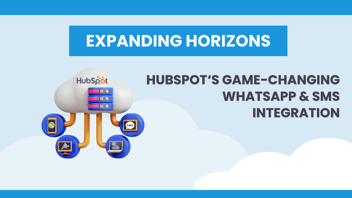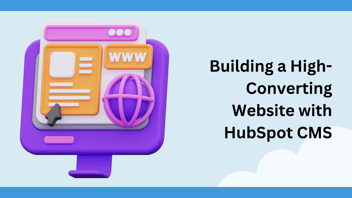In the sphere of Content Management Systems (CMS), HubSpot stands tall, offering unique functionalities that go beyond traditional CMS platforms. From its inception to its current state, HubSpot’s CMS has constantly evolved, catering to marketers and developers alike. But what’s the fuss about? Let’s delve into the journey and significance of HubSpot’s CMS in the modern digital era.
The Advent of HubSpot's CMS
HubSpot’s CMS debuted as a part of its all-in-one inbound marketing suite. Unlike traditional CMS platforms that were primarily developer-focused, HubSpot envisaged a system that empowered marketers to create, manage, and optimize websites without the constant need for IT support. The idea was revolutionary: A CMS deeply integrated with marketing, sales, and service tools.
From CMS to CMS Hub
The transformation of HubSpot's CMS to CMS Hub in 2020 was a significant milestone. With CMS Hub, HubSpot introduced enterprise-tier capabilities, advanced security features, and expanded serverless functions. Additionally, they integrated the CRM, ensuring a more personalized web experience for visitors.
The Impact on Digital Marketing
HubSpot's CMS has ushered in a new era for digital marketers. The integrated tools and analytics capabilities allow for more data-driven decisions.
1. Personalized User Experiences: With integrated CRM, websites can now offer personalized user content, enhancing engagement and conversions.
2. SEO Recommendations: The in-built SEO tools provide real-time recommendations, ensuring content is always optimized for search.
3. Drag-and-drop Editor: Marketers can create web pages without coding, allowing for quicker updates and changes.
For a deep dive into how HubSpot’s CMS revolutionizes web design, check out our earlier discussion here.
Why Developers Love It Too
It's not just marketers; developers have found value in HubSpot’s CMS too.
1. Serverless Functions: Developers can build web apps on the CMS, offering dynamic experiences.
2. Local Development: With local testing and debugging, developers can ensure everything is perfect before going live.
3. Flexible Themes: HubSpot’s CMS offers adaptability, allowing developers to craft unique web experiences.
Facing the Future
HubSpot's CMS is poised for more innovations. With the rise of AI and machine learning, the future could see even more personalized web experiences, automated content optimizations, and predictive analytics integrated within the CMS.
Conclusion
HubSpot's CMS, or rather CMS Hub, represents the perfect blend of marketing and development capabilities. Its continuous evolution ensures businesses can keep pace with the dynamic digital landscape.
If you’re contemplating adopting HubSpot’s CMS or wish to optimize your existing setup, reach out to our team at CETDIGIT. With our expertise, we ensure your digital platforms are not just functional but also future-ready.
For those who wish to understand the comprehensive capabilities of HubSpot beyond its CMS, our exploration of HubSpot’s workflow automation offers valuable insights.
At CETDIGIT, we've been at the forefront of digital transformations. As the digital realm continues to evolve, let's ensure your business stays ahead of the curve. Get in touch today!
The Evolution and Impact of HubSpot’s CMS
.jpg)
Popular Post
- Nostalgia Marketing’s Power with Millennials & Gen Z
- Sales and Sales Development in 2024: Why AI is a Must-Have for Growth
- SaaS Founder's Bible: The Rise, Fall, and Future of SaaS (2020-2025)- Part 1: Navigating Market Shifts
- CETDIGIT's Innovative Approach to Salesforce & HubSpot CRM Implementation
- What is Salesforce CRM?
Subscribe
Similar Blogs

Unpacking HubSpot: An Overview of the Main Hubs
In the dynamic world of digital marketing, HubSpot stands as a leading platform that offers robust...
READ MORE
HubSpot's Game-Changing WhatsApp & SMS Integrations: Expanding Horizons
1. Introduction: Staying Ahead in the Digital EraIn today's rapidly evolving digital marketing ...
READ MORE
Build High-Converting Websites with HubSpot CMS
Landing on a website that feels like it was designed just for you. Now that’s the stuff. It feels...
READ MORE
Leave a Comment